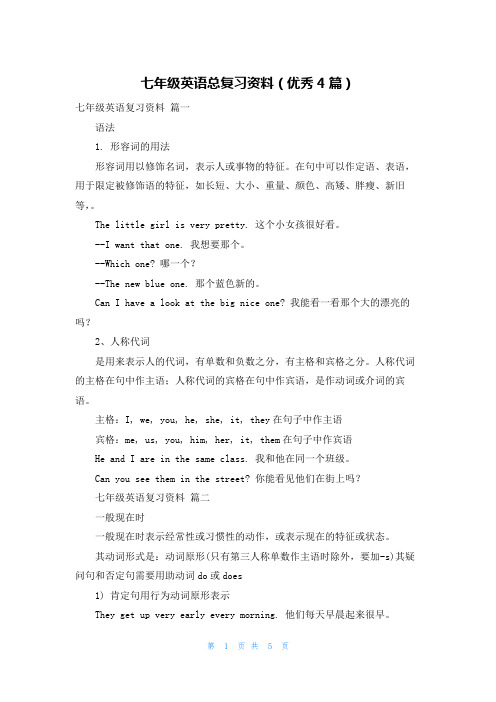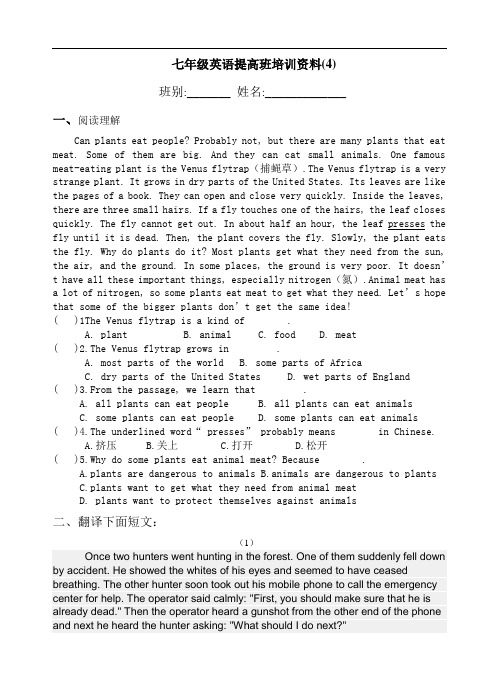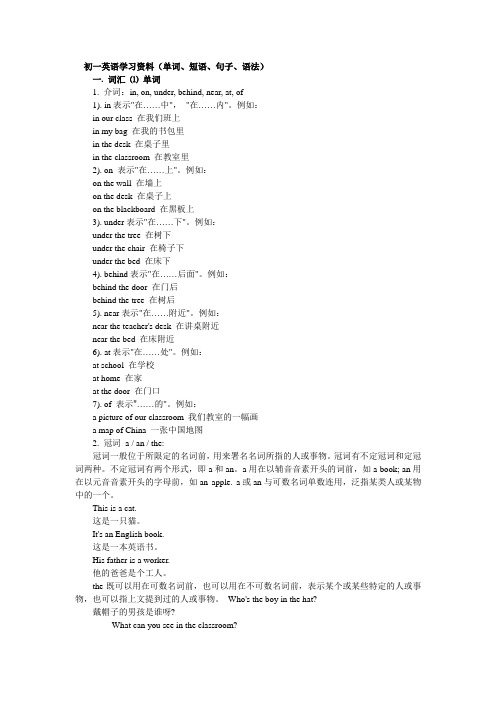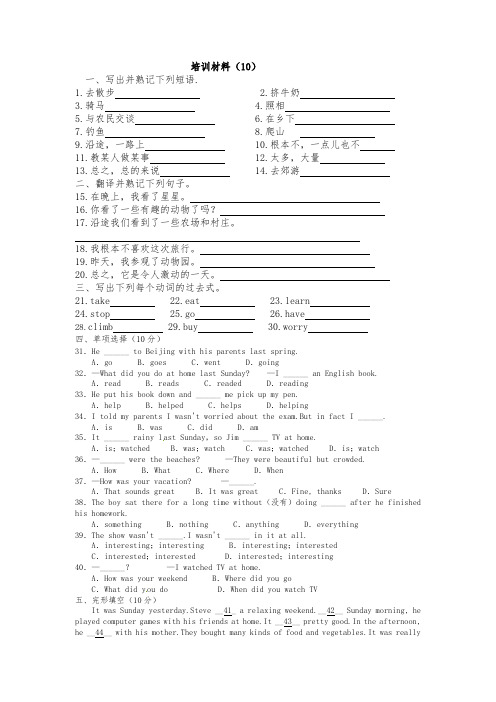七年级英语培训资料
七年级英语总复习资料(优秀4篇)

七年级英语总复习资料(优秀4篇)七年级英语复习资料篇一语法1. 形容词的用法形容词用以修饰名词,表示人或事物的特征。
在句中可以作定语、表语,用于限定被修饰语的特征,如长短、大小、重量、颜色、高矮、胖瘦、新旧等,。
The little girl is very pretty. 这个小女孩很好看。
--I want that one. 我想要那个。
--Which one? 哪一个?--The new blue one. 那个蓝色新的。
Can I have a look at the big nice one? 我能看一看那个大的漂亮的吗?2、人称代词是用来表示人的代词,有单数和负数之分,有主格和宾格之分。
人称代词的主格在句中作主语;人称代词的宾格在句中作宾语,是作动词或介词的宾语。
主格:I, we, you, he, she, it, they在句子中作主语宾格:me, us, you, him, her, it, them在句子中作宾语He and I are in the same class. 我和他在同一个班级。
Can you see them in the street? 你能看见他们在街上吗?七年级英语复习资料篇二一般现在时一般现在时表示经常性或习惯性的动作,或表示现在的特征或状态。
其动词形式是:动词原形(只有第三人称单数作主语时除外,要加-s)其疑问句和否定句需要用助动词do或does1) 肯定句用行为动词原形表示They get up very early every morning. 他们每天早晨起来很早。
I visit my grandparents four times a month. 我一个月去看望祖父母四次。
2) 否定句用don’t + 动词原形来表示We do not go shopping on Sundays. 我们周日不去购物。
I do n’t think you like this colour. 我想你不喜欢这个颜色。
七年级英语提高班培训资料4

七年级英语提高班培训资料(4)班别:_______ 姓名:_____________一、阅读理解Can plants eat people? Probably not, but there are many plants that eat meat. Some of them are big. And they can cat small animals. One famous meat-eating plant is the Venus flytrap(捕蝇草).The Venus flytrap is a very strange plant. It grows in dry parts of the United States. Its leaves are like the pages of a book. They can open and close very quickly. Inside the leaves, there are three small hairs. If a fly touches one of the hairs, the leaf closes quickly. The fly cannot get out. In about half an hour, the leaf presses the fly until it is dead. Then, the plant covers the fly. Slowly, the plant eats the fly. Why do plants do it? Most plants get what they need from the sun, the air, and the ground. In some places, the ground is very poor. It doesn’t have all these important things, especially nitrogen(氮).Animal meat has a lot of nitrogen, so some plants eat meat to get what they need. Let’s hope that some of the bigger plants don’t get the same idea!( )1The Venus flytrap is a kind of .A. plantB. animalC. foodD. meat( )2.The Venus flytrap grows in .A. most parts of the worldB. some parts of AfricaC. dry parts of the United StatesD. wet parts of England( )3.From the passage, we learn that .A. all plants can eat peopleB. all plants can eat animalsC. some plants can eat peopleD. some plants can eat animals( )4.The underlined word“ presses” probably means in Chinese.A.挤压B.关上C.打开D.松开( )5.Why do some plants eat animal meat? Because .A.plants are dangerous to animalsB.animals are dangerous to plantsC.plants want to get what they need from animal meatD. plants want to protect themselves against animals二、翻译下面短文:(1)Once two hunters went hunting in the forest. One of them suddenly fell down by accident. He showed the whites of his eyes and seemed to have ceased breathing. The other hunter soon took out his mobile phone to call the emergency center for help. The operator said calmly: "First, you should make sure that he is already dead." Then the operator heard a gunshot from the other end of the phone and next he heard the hunter asking: "What should I do next?"(2)I Wasn't AsleepWhen a group of women got on the car, every seat was already occupied. The conductor noticed a man who seemed to be asleep, and fearing he might miss his stop, he nudged him and said: "Wake up, sir!""I wasn't asleep," the man answered."Not asleep? But you had your eyes closed.""I know. I just hate to look at ladies standing up beside me in a crowded car."三、英语IQ题:先翻译中文,再回答。
初一英语学习资料

初一英语学习资料(单词、短语、句子、语法)一. 词汇⑪单词1. 介词:in, on, under, behind, near, at, of1). in表示"在……中","在……内"。
例如:in our class 在我们班上in my bag 在我的书包里in the desk 在桌子里in the classroom 在教室里2). on 表示"在……上"。
例如:on the wall 在墙上on the desk 在桌子上on the blackboard 在黑板上3). under表示"在……下"。
例如:under the tree 在树下under the chair 在椅子下under the bed 在床下4). behind表示"在……后面"。
例如:behind the door 在门后behind the tree 在树后5). near表示"在……附近"。
例如:near the teacher's desk 在讲桌附近near the bed 在床附近6). at表示"在……处"。
例如:at school 在学校at home 在家at the door 在门口7). of 表示"……的"。
例如:a picture of our classroom 我们教室的一幅画a map of China 一张中国地图2. 冠词 a / an / the:冠词一般位于所限定的名词前,用来署名名词所指的人或事物。
冠词有不定冠词和定冠词两种。
不定冠词有两个形式,即a和an。
a用在以辅音音素开头的词前,如a book; an用在以元音音素开头的字母前,如an apple. a或an与可数名词单数连用,泛指某类人或某物中的一个。
This is a cat.这是一只猫。
七年级英语提高班培训资料(8)

七年级英语提高班培训资料(8)班别:_______ 姓名:_____________一、完形填空(10%)通读下面短文,把握其大意,然后在各题所给的A、B、C三个选项中,选出一个最佳选项。
George Wilson was the owner of a watch shop. One day he told his son James, “I’ll teach you all I know about watches.”For the first few weeks, James 1 the front of the shop. He worked hard2 was helpful to the customers ( 顾客). George was very pleased with (对…专门中意)him.3 about six months, James said to his father, “Is there anything else you want to teach me?”“Yes,” said George, “It’s t ime for me to teach you how to make 4 . ”“I know that,” said James, “You buy watches at one price and sell them at 5 price. That’s how we get so much money.”“That’s true. 6 we don’t make most of the money from it.”He 7 a watch from the counter(柜台). “What do you think of this watch?”“That’s a cheap watch. We can only get a few dollars from 8 it.”“You are 9 , my son, ” George said, “Those cheap ones get more money to us than any other watch in the shop.”“I don’t understand,” James said.“Because they are really cheap, they are always breaking, and we make our money from fixing(修理) 10 .”()1. A. looked for B. looked at C. looked after()2. A .and B. but C. or()3. A. Before B. Soon C. After()4. A. money B. watches C. clocks()5. A. the same B. a higher C. a lower()6. A. But B. So C. And()7. A. picked up B. put up C. pulled up()8. A. buying B. selling C. repairing()9. A. right B. wrong C. clever()10. A. it B. them C. one二、. 阅读明白得(10%)Mr. White worked in an office in London, but he lived in the country and came to work by train every day. The station was not very far from his office, and he always went on foot from the station to his office and back from his office to the station. Every evening he walked past a poor man near a bridge. The man sat at the road and sold matches( 火柴), and there was a dog near him. There was a piece of wood round the dog’s neck, and the words “ I AM BLIND ” were on the piece of wood.Mr. White was a kind man. He always stopped and gave a penny( 便士) to the man, but he did not take any of his matches.One day, Mr. White had a lot of work in his office and left the office very late. He came to the man and his dog, but he did not stop. The poor man stood up quickly, ran after him and said, “ You’re always very kind to me . Give me a penny today. I’m a poor man.”Mr. White stopped and he was surprised(惊奇的). Then he said, “ You’re a blind man. How did you see me?”The poor m an said, “ No, I’m not blind. My dog is.”()1. Mr. White lived in __________.A. LondonB. the city near LondonC. the country near LondonD. the country not far from his office()2. Mr. White went to his office ___________.A. by trainB. first by train and then on footC. on footD. first on foot and then by train()3. Every evening Mr. White passed a poor man near a bridge _________.A. on his way to workB. on the way to his officeC. on his way home by trainD. on his way home()4. One day Mr. White did not stop and give the poor man a penny because ______.A. he did not like the manB. he was afraid of the dogC. he worked too lateD. he hurried to catch the train()5. What is the Chinese for “ blind ” ?A. 看见的B. 聋的C. 瞎的D. 哑的Ex3:complete the sentences:1. 他经常走路上班He often ______________________2、坐飞机旅行是最舒服的方式。
初一英语补课内容

名词复数构成方法
4.以o结尾的名词,一般+s,有些+es, 有些均可。 +es:tomato/tomatoes; potato/potatoes; hero/heroes 一般以辅音+o结尾,复数加es; 但有些以o结尾 的外来语,变复数时加s.如:photo;piano +s(以元音+o结尾):zoo/zoos; bamboo/bamboos 等 可加s可加es:zero/zeros或zeroes 等 5.以f,fe结尾:有些+s,如:roof/roofs; chief/chiefs 有些将f,fe变为ves, 常用的有8个: knife, leaf, thief, half, self, loaf(面包), wolf.
Learn to say
3. I was 7 years old in this photo. I was 130 cm tall and weighed 30 kg. I was in primary school.
primary school 小学 in primary school 上小学
Read and think
There be 句型
There is/are(was/were) … +地点状语 There be 句型中be动词的单、复数由后面的名 词决定。 There is a pair of shoes under the bed. How many +可数名词+be+there+地点状语 How much+不可数名词+be+there+地点状语 --- 此时be用单数is或was
形容词比较级 最高级
一 单音节形容词
七年级英语教辅资料

七年级英语教辅资料
以下是一些七年级英语教辅资料的建议:
1. 《牛津初中英语七年级上册》:这是一本经典的英语教材,涵盖了七年级上册的所有单元内容,包括词汇、语法、听力、口语、阅读和写作等。
2. 《牛津英语搭配辞典》:涵盖了丰富的英语搭配用法,对于初学者来说是一个非常实用的工具,可以帮助学生更准确地使用和掌握单词。
3. 《英语语法概述》:这本书可以帮助学生系统地学习英语语法知识,包括句子的结构、时态、语态、虚拟语气等,帮助学生更好地理解并正确运用英语语法。
4. 《牛津英汉双解小词典》:这本词典是学生们学习英语的好伙伴,提供了详细的英文解释和中文翻译,对于学生查阅单词意思和用法非常有帮助。
5. 《七年级英语考点精解》:这本书总结了初中英语七年级的重点考点,并提供了丰富的例题和解析,帮助学生更好地备考和提高自己的英语水平。
6. 网上资源:可以在一些英语教学网站上找到七年级的英语学习资料,例如BBC Learning English、GoEnglish等,这些网站提供了丰富的英语学习资源,包括听力、阅读、口语、写作等。
希望以上资料对你有所帮助,祝你学习进步!。
七年级英语提高班培训资料(9)

七年级英语提高班培训资料(9)班别:_______ 姓名:_____________一、To translate the sentences into English. (Handouts)1.他们从香港到北京要花多长时间?_____________________ their journey from Hong Kong to Beijing ______?2.黄河是中国第二大河。
The Yellow River ______________________________________ in China.3.哪一课最难学?Which lesson is ______________________________________________?4.他们认为英语是门最有趣的学科。
They_______________________________________________________5.汤姆家离学校最远。
Tom__________________________________________________school.6.相同的路程乘小轿车约需30分钟。
__________________________________ takes about 30 minutes.7.车票不贵,你可以在车站买票。
The fare isn’t expensive, and you can ____________________________8.学校离你家有多远?How far do you travel_____________ your house______________ school?9.英国航空公司是最繁忙的国际航线之一。
British Airways___________________________________________ airlines.10.最受欢迎的出行方式是搭渡船。
七年级英语基础培训材料

培训材料(10)一、写出并熟记下列短语.1.去散步2.挤牛奶3.骑马4.照相5.与农民交谈6.在乡下7.钓鱼8.爬山9.沿途,一路上10.根本不,一点儿也不11.教某人做某事12.太多,大量13.总之,总的来说14.去郊游二、翻译并熟记下列句子。
15.在晚上,我看了星星。
16.你看了一些有趣的动物了吗?17.沿途我们看到了一些农场和村庄。
18.我根本不喜欢这次旅行。
19.昨天,我参观了动物园。
20.总之,它是令人激动的一天。
三、写出下列每个动词的过去式。
21.take 22.eat 23.learn24.stop 25.go 26.have28.climb 29.buy 30.worry四、单项选择(10分)31.He ______ to Beijing with his parents last spring.A.go B.goes C.went D.going32.—What did you do at home last Sunday? —I ______ an English book.A.read B.reads C.readed D.reading33.He put his book down and ______ me pick up my pen.A.help B.helped C.helps D.helping34.I told my parents I wasn't worried about the exam.But in fact I ______.A.is B.was C.did D.am35.It ______ rainy l ast Sunday,so Jim ______ TV at home.A.is;watched B.was;watch C.was;watched D.is;watch 36.—______ were the beaches? —They were beautiful but crowded.A.How B.What C.Where D.When37.—How was your vacation? —______.A.That sounds great B.It was great C.Fine, thanks D.Sure 38.The boy sat there for a long time without(没有)doing ______ after he finished his homework.A.something B.nothing C.anything D.everything39.The show wasn't ______.I wasn't ______ in it at all.A.interesting;interesting B.interesting;interestedC.interested;interested D.interested;interesting40.—______?—I watched TV at home.A.How was your weekend B.Where did you goC.What did y ou do D.When did you watch TV五、完形填空(10分)It was Sunday yesterday.Steve __41_ a relaxing weekend.__42__ Sunday morning, he played computer games with his friends at home.It __43__ pretty good.In the afternoon, he __44__ with his mother.They bought many kinds of food and vegetables.It was really relaxing and exciting.In the evening, he __45__ a talk show with his parents and lis tened to some songs by a __46__ singer.__47__ Ann had a busy weekend.She __48__ stopped working.On Sunday morning, she cleaned her bedroom and did her homework.In the afternoon, she went to visit her uncle and __49__ him do some farm work.In the evening, she cooked dinner for her parents.After dinner, she washed the dishes.Then she went out __50__ a walk with her dog.What about your weekend?41.A.has B.have C.had D.was42.A.In B.At C.For D.On43.A.be B.is C.was D.were44.A.goes shopping B.went shopping C.went to shopping D.went shops 45.A.watched B.watches C.looked D.see46.A.height B.medium C.popular D.long47.A.But B.Because C.Or D.So48.A.often B.always C.usually D.never49.A.helped B.liked C.asked D.told50.A.at B.for C.from D.onⅥ.阅读理解(30分)AKim went to a beautiful beach on Monday with his friends.It was sunny and hot.So they had great fun playing in th e water.In the afternoon,they went shopping.But the shops were crowded(拥挤),they didn't really enjoy it.The next day,it was rainy,so they went to a museum.It was boring.Kim found a small boy crying in the corner.The boy was lost.He helped the boy find his father.Kim was very happy.But he had no money for a taxi.So he had to walk back to the hotel.That made him very tired.On Wednesday,the weather was very cool.So they played tennis.They played all the morning.It was really fun.根据短文内容,判断句子正(T)误(F)。
- 1、下载文档前请自行甄别文档内容的完整性,平台不提供额外的编辑、内容补充、找答案等附加服务。
- 2、"仅部分预览"的文档,不可在线预览部分如存在完整性等问题,可反馈申请退款(可完整预览的文档不适用该条件!)。
- 3、如文档侵犯您的权益,请联系客服反馈,我们会尽快为您处理(人工客服工作时间:9:00-18:30)。
英语分类语法复习资料一、词法1、名词A)、名词的数规则变化略一)一般只有复数,没有单数的有:people,pants, shorts, shoes, glasses, gloves, clothes, socks二)单词形式不变,既可以是单数也可以是复数的有:police警察局,警察, class班,同学, family家,家庭成员三)合成的复数一般只加主要名词,多数为后一个单词。
如:action movie-action movies, pen pal-pen pals; 但如果是由man或woman所组成的合成词的复数则同时为复数。
如:man doctor-men doctors, woman teacher-women teachers四)有的单复数意思不同。
如:fish鱼fishes鱼的种类, paper纸papers报纸,卷子,论文, work工作works作品,工厂, glass玻璃glasses玻璃杯,眼镜, orange桔子水oranges橙子, light光线lights灯, people人peoples民族, time时间times时代, 次数, chicken 鸡肉chickens 小鸡五)单个字母的复数可以有两种形式直接加s或’s。
如:Is (I’s), Ks (K’s)。
但如是缩略词则只加s。
如:IDs, VCDs, SARsB)名词的格当我们要表示某人的什么东西或人时,我们就要使用所有格形式。
构成如下:一)单数在后面加’s。
如:brother’s, Mike’s, teacher’s二)复数以s结尾的直接在s后加’,如果不是以s结尾的与单数一样处理。
如:Teachers’Day教师节, classmates’; Children’s Day六一节, Women’s Day三八节三)由and并列的名词所有时,如果是共同所有同一人或物时,只加最后一个’s,但分别拥有时却分别按单数形式处理。
如:Mike and Ben’s room迈克和本的房间(共住一间),Mike’s and Ben’s rooms 迈克和本的房间(各自的房间)2、代词项目人称代词物主代词反身代词人称主格宾格形容词名词性反身代词第一人称单数I me my mine myself复数we us our ours ourselves第二人称单数you you your yours yourself复数you you your yours yourselves第三人称单数she her her hers herselfhe him his his himselfIt it its its itself复数they them their theirs themselves3.冠词1)不定冠词a/an的用法,是根据读音来用比如hour前要用an,a European country/an English book/an umbrella用在有形容词修饰的名词前的用法,比如:a pencil(一支铅笔),a book(一本书);an用在元音音素开头的名词前,如an eraser(一块橡皮)。
如果名词前有修饰语,用a还是用an,则以该修饰语的第一音素决定用a还是用an。
a clock 一座钟an old clock 一座旧钟 a book 一本书an English book 一本英语书a delicious apple 一个可口的苹果an apple 一个苹果。
以及一日三餐前比如have breakfast和have a big breakfast.2)定冠词the的用法。
a.用在世界上独一无二的事物或方位名词的前面。
The world/the sun/the earth/theeast/west/north/south/left/right等b.用在专有名词前面。
the Great Wall/the People’s Republic of China. c.用在姓氏的复数形式前,表示全家人或这一姓氏的夫妇二人。
the Smiths/Zhangs. d. 用在乐器名词前。
Play the guitar/violin/piano.3)零冠词的用法。
a.国名人名地名节日月份前不加冠词。
Tian’anmen Square/Tom/China/New Year’s Day b. 乘飞机去北京花了史密斯一家人一个小时。
[误] It takes Smiths a hour to go to Beijing by a plane.[正] It takes the Smiths an hour to go to Beijing by plane.[析] 1.表示“……一家人”用结构“the + 姓氏复数”;2.hour 一词的第一个字母不发音,它是以元音音素开头的,所以“一小时”要用an hour;3.用介词by表示“乘坐”某种交通工具时,交通工具名词前不加任何冠词。
热身练习1.想一想,将下表补充完整。
2.用所给词的适当形式填空。
1)That is not _________ kite. That kite is very small, but _________ is very big. ( I )2)The dress is _________. Give it to _________. ( she )3)Is this _________ watch? ( you ) No, it’s not _________ . ( I )4)_________ is my brother. ________ name is Jack. Look! Those stamps are _________. ( he )5)_______ dresses are red. ( we ) What color are ______? ( you )6)Show _________ your kite, OK? ( they )7)I have a beautiful cat. ______name is Mimi. These cakes are ______. ( it )8)Are these ________ tickets? No, ________ are not _________. ________ aren’t here. ( they )9)Shall _________ have a look at that classroom? That is _________ classroom.( we )10)_____ is my aunt. Do you know _____ job? ______ a nurse. ( she )11)Where are _________? I can’t find _________. Let’s call _________ parents. ( they )12)Don’t touch ______. _______ not a cat, _______ a tiger! ( it )13)_________ sister is ill. Please go and get _________. ( she )14)The girl behind _________ is our friend. ( she )( )1. Tom Hanks is American actor.A. aB. anC. theD. 不填( )2. –Do you enjoy your stay in Hangzhou? --Yes. I’ve had wonderful time.A. /B. aC. theD. an( )3. --Ellen, you look so happy. --Well, I’ve got A in my history test.A. aB. anC. theD. /( )4. Millie has e-dog and its name is Hobo.A. aB. anC. theD. 不填( )5. ---What’s this in English? ---It’s ruler.A. aB. theC. 不填( )6. We’re going to have exam tomorrow.A. aB. anC. theD. /( )7. There is apple tree in my garden. It’s over ten years old.A. theB. aC. anD. 不填( )8. ---What can I do for you? ---I want orange blouse for my daughter.A. anB. theC., aD. /( )9. exciting news! We will have long holiday after the exam.A. What a, anB. What, aC. How an, theD. How, the( )10. ---Do you know lady in blue?A. theB. aC. anD. 不填( )11. ---Excuse me, sir, which cup is yours? --- small one.A. /B. AC. AnD. The( )12. history of this special Pacific island brought unusual feeling to me.A. The, aB. A, anC. The, anD. A, a( )13. This is song I’ve told you about. Isn’t it beautiful one?A. the, aB. the, theC. a, aD. a , the( )14. Look at skirt, I bought it for Mum on Mother’s Day. Isn’t it nice?A. aB. anC. theD. 不填( )15. ---Mum, where is my MP3? ---It’s in black box near the computer.A. aB. anC. theD. /( )16. ---Who is man with glasses?---Oh, he’s our new English teacher, Mr. Li.A. aB. anC. theD. /( )17. My brother studies in university. university is very far from here.A. an, TheB. a, TheC. the, AD. a, A( )18. Could you tell me answer to this problem? I can’t work out it myself.A. aB. anC. theD. 不填( )19. People like to see films on TV instead of going to cinema.A. the, theB. 不填, theC. the, 不填( )20. In the United States, Father’s Day falls on third Sunday in June.A. the, 不填B. the , aC. 不填,theD. a, 不填( )21. ---What can I do for you, madam? ---I want ______orange skirt for my daughter.A. aB. theC. anD.不填( )22. ---Did you do well in ______ English exam?---Yes, I got “A”.A. the, anB. an, theC. a, /D. the, a( )23. ---What are you going to be when you grow up?---I hope to be ___ animal doctor when I grow up.A. aB. anC. theD. 不填( )24. ---What’s the matter with you?---I caught_____ bad cold and had to stay in_____bed.A. a, /B. a, theC. a, aD. the, the( )25. ---Did you see the football match last night?---Yes, I’ve never seen_____exciting match before.A. such aB. so aC. such anD. so an( )26. ---How do you get home from _____? By bus?---No, I walk._______isn’t very far.A. school, The schoolB. the school, The schoolC. the school, SchoolD. school, School( )27. My uncle isn’t_____old man, and he likes playing______football.A. a, aB. an, anC. the, theD. an, /( )28. ---How far is it from our school to ______seaside?---It is_______ eight-kilometer walk from here.A. the, anB. /, anC. the, aD. /, a( )1. Tomorrow I'm going to my________. It's a _________.A aunt...five minutes' walkB aunt's...five minute's walkC aunt...five minute's walkD aunt's...five minutes' walk( )2. A computer is one of the greatest ________ in this century.A inventorsB inventionsC invitationsD invention( )3. We haven't ________ homework to do today.A manyB a lot ofC fewD much( )4. Mr. Black is a teacher full of ________.Yesterday he told us his ________ in the U.S.A experience...experienceB experiences...experiencesC experience...experiencesD experiences...experience( )5. Three hours ________ enough for a __________ boy to read books.A is...ten-year-oldB are...ten-year-oldC is...ten-years-oldD are...ten-years-old( )6. _________that pair of new _________ expensive?A Is...shoeB Are...shoeC Is...shoesD Are...shoes( )7. Linda, I've bought many_______. Now let's make the birthday cake.A fresh eggsB chocolate milkC frozen foodD rice dumplings( )8. The two ________ are my________.A womans doctors...girls friendsB women doctors...girls friendsC woman doctors...girl friendsD women doctors...girl friends( )9. Mr. Lin often gives us _______ by e-mail.A some good informationB some good informationsC good informationsD a good information( )10. These are ________ houses.A Wang and my uncleB the Wang's and my uncle'sC the Wangs' and my uncleD the Wangs' and my uncle's( )11. People waste _______ water every day.A a large number ofB a huge amount ofC manyD quite a lot( )12. They tended(照顾)________,and buried(埋葬)_________.A wounded...deadB the wounded...deadC the wounded...the deadD wounded...the dead( )13. We are__________.They are_________.A Chinese...GermenB Chinese...GermanC Chinese...GermanyD Chinese...Germans ( )14.Did you have a lot of _________ last weekend?A funnyB funniesC funD funs( )15. Which is wrong?_________A How many cartons of milk are there on the tables?B How much carton of milk is there on the table?C How many cartons are there on the table?D How much milk is there on the table?3、动词A)第三人称单数略特殊的有:are-is, have-hasB)现在分词变化规则略注:以ie结尾的变ie为y再加ing。
